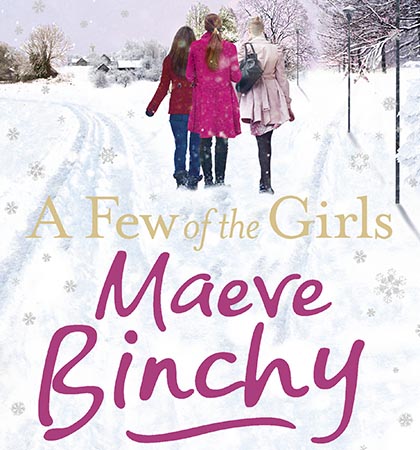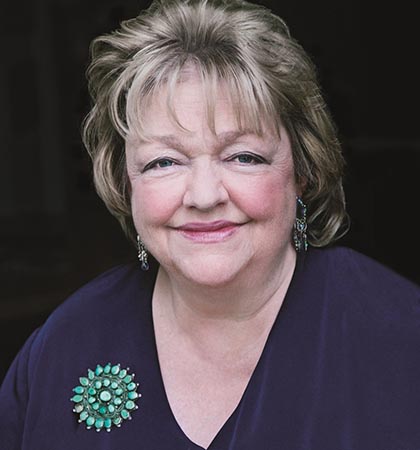THERE were five places she could go for Christmas. Now, according to statistics this must be a very good average. You didn’t often find middle-aged spinsters with five invitations for Christmas Day.
Janet knew that she was, by any standards, lucky. So many people felt beached and lonely with nothing to do for the season that everyone else had defined as festive. Which one would she accept?
Years of working in an office where decisions had to be made came to her assistance. Janet would look at the choice calmly and reasonably and make the best one.
She could go and stay with her mother. Mother was, in fact, seventy, dressed like thirty-five, and married to a man many years her junior. Mother would enjoy seeing her, but Janet would have to dress up spectacularly. She would have to pretend to be much less than her fifty years. It wasn’t in Mother’s scheme of things to acknowledge a daughter who was half a century old.
There would be cocktail parties and a great deal of socialising, Mother had never been one for the hearth and home.
Or she could go to her father. Father lived alone, surrounded by his books. Father, who always seemed to have difficulty in remembering who anyone, including his nearest family, might be. Father, absent-minded to such a degree that everyone assumed he was putting it on.
Father just didn’t care for people. He never had. It was a mystery how he had ever married and had three children. Since the divorce Father had never contacted any of them, but always seemed mildly and politely interested to see them when they turned up.
Father always said courteously, ‘If you’re stuck for anywhere to go at Christmas you’re always welcome to bring a few books over here.’
It counted as an invitation.
There was Janet’s sister, Kate. Kate had said firmly, ‘You can’t possibly stay on your own at Christmas. You must join us. We have a rota and everyone contributes. Suppose we say that you do the washing-up Christmas Eve, make the mince pies, and prepare the vegetables on the day after Christmas?’ It had been businesslike, brisk, almost like booking in casual labour for the Feast. But it was an invitation to join them.
There was Janet’s brother Shane.
Shane was an alcoholic and so found Christmas a trial. Everything in the way of entertainment seemed to be connected with drink.
So Shane liked to get away from it all. He rented a cottage, miles away from anywhere, and holed up there for four days. Sometimes some of his friends from the Support Group came as well. Sometimes it was just Shane and his girlfriend – who was recovering from addiction to tranquillisers. They both talked long and earnestly about Getting Sorted, and often raced to the telephone to call their therapists. It wouldn’t be restful, it would be far from festive, but it was a place to go.
And of course there was Janet’s friend Rose.
Rose, who had warned her against the faithless Edward. Rose, who had predicted the way Edward would leave her: at a time of maximum inconvenience and major heartbreak.
Rose had said grimly that if Edward had not left his wife for Janet when Janet was twenty-eight, he was becoming less likely to do so with every passing year. And now that Janet had actually reached the age of fifty the situation had become ludicrous. Rose had said to mark her words. Edward would bow out as soon as his long-term girlfriend, his faithful Janet, who had sacrificed everything for him, had reached fifty and could no longer be called a girl.
Rose had what she called a healthy disregard for men. Janet thought that it wasn’t totally healthy to dismiss half the population of the globe, but Rose was firm in her convictions. She knew all about men, she said firmly. She had married one of them.
He had long gone and was not greatly regretted.
Rose, for many Christmases, had urged Janet to accompany her to the sun.
What could be nicer than a hotel where there would be anonymity, and a swimming pool with sunshine?
But year after year Janet had always refused politely.
Edward always called with Janet’s Christmas present each Christmas Eve. She couldn’t possibly be away.
But what about the day itself? Rose would snort. A day when people could feel low and vulnerable unless they were in a secure situation.
Did Edward call on Christmas Day? No, for over twenty years he never had.
Now that it was finally over, surely Janet could break the mould of her existence and come abroad with Rose.
Together they would walk through the Moroccan souks and buy jewellery, they would take trips into the mountains and photograph the local markets. They would have meals in Arab restaurants and listen to traditional musicians and admire the belly dancers.
It would be a different world, a different universe.
That was her fifth choice.
Poor Miss Mills, sad Janet Mills aged fifty, deserted now finally by the man she had loved so foolishly for almost half her life, had five places to go for Christmas.
So when anyone asked her what she was going to do, she told them, truthfully, that she still had to make up her mind.
Janet Mills had worked for a long time in the office. She had never got any serious promotion but she was considered very sound. People often said that if you wanted to know how something was done ask Janet. Young employees were told that Miss Mills knew everything.
She kept in the background because of Edward, of course.
How could he shine so brightly unless she had dimmed her own light? It was obvious to her and clear.
She couldn’t understand why everyone else seemed to think it so puzzling.
‘That shark is using your brains to get where he wants to get,’ Rose had hissed through clenched teeth. Most men were sharks to Rose. Some of them were barracudas; it was hard to know what system she used to differentiate.
‘Surprising that you haven’t got promotion if your friend is doing so well,’ Mother had hinted heavily.
‘Do you like . . . doing this menial office work?’ Father had asked mildly.
‘If he’s not going to make an honest woman out of you, the very least he can do is make you his deputy,’ Kate had snarled.
‘Dependency is a kind of addiction,’ Shane, her brother, had confided. ‘Your dependence on Edward in many ways mirrors my own on alcohol. Perhaps as a family we are just very sick people.’
Miss Janet Mills had a very simple way of making decisions. She worked in exactly the opposite way to everyone else.
Instead of deciding which would be the best, she would always go for which would be the worst, and then she would eliminate the alternatives one by one.
Usually the last one to be eliminated was the wisest decision.
So Janet took her spiral notebook and began to work out her priorities by starting at the place she would least like to go.
That was definitely to her brother Shane.
For one thing, Shane would hardly notice whether she were there or not. So there would be no question of disappointing him or letting him down. He was the most un-festive of creatures. There would be no holly or ivy or mistletoe decorating the frugal cottage. There would be no newspapers or magazines in case they advertised alcohol, there would be a litany of woes against the world.
Janet had always decorated her apartment in seasonal berries and put up her Christmas cards. For twenty years and more Edward had said that it was like a parody of Christmas Eve when he would come to sip his drink and give her his gift, something she would have hinted at, suggested, and all but bought for him to give her.
But the place had never been joyless and denying the season like Shane’s surroundings would be.
She rejected her father next. He too would be barely aware of her presence. She would add nothing to his celebration by being there. His housekeeper would have prepared a meal and it would be eaten in agreeable and, from his point of view, companionable silence.
But there would be no music on the player, no lovely old traditional carols like Janet would play. No Midnight Mass or Service of Nine Carols and Nine Lessons on the television. Such noise would distract from reading.
So she struck his name from the list.
He was closely followed by Janet’s sister, Kate. Kate had a marriage that worked. Or sort of worked. That is, if you thought of marriage as some kind of military campaign.
They operated by some kind of schedule in that house. If Janet was ever invited to dinner it was a case of:
See you in your right mind at nineteen forty hours, we sit down to eat at twenty hours and let's say carriages at eleven.
Christmas there would be ordained and planned by a schedule typed out on a clipboard.
Janet’s own little home had never needed any such severity. Edward always said it was a place where anyone could feel truly relaxed. There were no rules, no timetables. It would be hard to spend Christmas in a place where there was a Programme of Activities and Duties. Kate was eliminated.
Would Mother be very disappointed if Janet were to refuse the invitation?
No, in truth she believed that Mother would be relieved. There was always so much to do, those hours on the exercise bicycle, those long sessions at the facial sauna, the careful painting of nails, lacquering of hair into position.
And Janet would have to do something similar if she were not to let Mother down, blow her cover and reveal her as a woman with a middle-aged daughter. Such pretence would be wearying.
Here, in her own place, there was no need to impress or create an image. It would be hard to leave such a peaceful place and go to one of such frenetic activities as her mother’s.
A line went through her mother’s name.
Now it was a matter of Rose.
This was the option that made most sense. Rose had said so from the start.
‘Why go to your dreary family, each one of them set in their own ways?’ she had asked Janet in the tone of voice that brooked no disagreement.
‘This is what you should have been doing for years rather than waiting for that low life to get in touch.’ she said. She would say it again and again.
Rose would be a good friend and a pleasant companion.
But it would be sun-filled days and moonlit evenings full of ‘I-Told-You-So’, full of fury about the known faithlessness of men.
In order to have any peace she would have to deny Edward. She would have to say that he had been a waste of time. Admit that he had taken the best years of her life and given her nothing in return.
But this was too high a price to pay.
She would not betray Edward.
He had not taken the best years of her life; he had given her the best years.
She had been happy. Deliriously happy when he was there, happy in remembrance of his visit and happy in anticipating the next time she would see him.
She felt no sense of being passed over, or having sacrificed her own career for his.
His various promotions were a joy to her on each occasion, celebrated in her peaceful, cheerful flat with champagne and lovemaking.
He knew she wanted the best for him as he did for her. They were bound by no rules and regulations like her sister Kate, no pretence like her mother was, no fears and phobias like her brother, no cold indifference like her father’s touched their relationship. There was no bitterness and hate as there was in Rose’s life.
 So, for the first time in her spiral notebook the decisions had not automatically filtered one to the top.
So, for the first time in her spiral notebook the decisions had not automatically filtered one to the top.
She would accept none of these invitations.
She would stay instead in her own apartment.
She would decorate it with green leaves and red berries.
She would put up cards and silver bells.
She would play the old traditional songs of Christmas. She would sip good wine and watch the television programmes showing how people all around the world were celebrating. She was not a woman whose life had been ruined. She was one whose life had been enhanced.
True, she would never be seen as one of the Sisters who led the fight for women’s independence, but neither would she be looked on as a poor female who thought that youth and grooming were the only feminine traits which mattered. She was not like Rose, but neither was she like her mother.
She would sit in her own place and have her own Christmas. She believed that, despite his protestations that their love was over, Edward would come to see her as usual on Christmas Eve and she would be here for him.
She would ask nothing more than he was able to give and she felt in her heart that he would still be able to give the little he had given over the past two decades. It cost him so little and it meant so much.
He had once said she was the true spirit of Christmas. Wasn’t that a wonderful memory to have, the man you loved paying such a compliment? What wife, what young loved girl ever heard words so full of meaning?
And, as the shops filled up their windows with seasonal gifts, as the fuss and excitement of the Christmas season began all over again, Janet Mills went through it calmly. Five people were disappointed that she would not join them at their invitation, or said they were disappointed. Heads were shaken, brows darkened and tut-tuts were heard.
But Miss Mills, the calm Miss Mills who knew where everything was in the office, and how everything was done and how decisions were made, didn’t seem to be aware of the head shaking and the tutting and the sighing about her.
None of these people had ever been called the Spirit of Christmas. None of them would ever know the happiness she had known – and since happiness was in the heart anyway, she knew she would have a better Christmas than all of them put together.
A Few of the Girls by Maeve Binchy is published in Hardback by Orion priced £18.99



